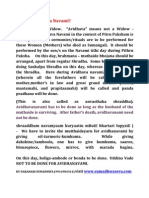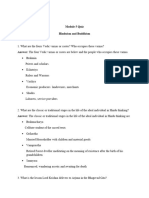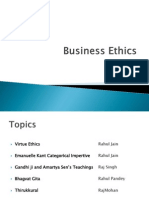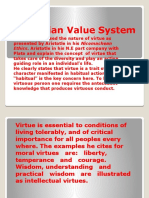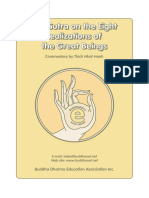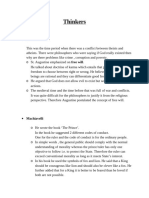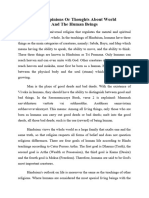What Is Here Is Found Elsewhere
What Is Here Is Found Elsewhere
Uploaded by
HaRa TCopyright:
Available Formats
What Is Here Is Found Elsewhere
What Is Here Is Found Elsewhere
Uploaded by
HaRa TOriginal Description:
Original Title
Copyright
Available Formats
Share this document
Did you find this document useful?
Is this content inappropriate?
Copyright:
Available Formats
What Is Here Is Found Elsewhere
What Is Here Is Found Elsewhere
Uploaded by
HaRa TCopyright:
Available Formats
What is here is found elsewhere.
What is not here is nowhere.
—Mahabharata I.56.34−35
If you believe in God, and He turns out to exist, then you have obviously made a good
decision; however, if He does not exist, and you still believe in Him, you haven’t lost
anything; but if you don’t believe in Him and he does exist, then you are in serious
trouble.
One of Hinduism’s attractive features is of multiple goals to the good life. The first goal
is to come to grips with kama, ‘human desire’. It is reassuring that pleasure has a valued
place in the good life. A second goal is
artha, ‘material wellbeing’, which makes sense, for how can one be happy in conditions
of extreme deprivation? A third objective of life is
dharma or moral wellbeing. The final goal is moksha, ‘spiritual
liberation’ from our fragmented, finite and suffering existence. I have always felt that
Indians are sensible, like Aristotle, in believing in multiple paths to a flourishing life.
Books which illuminate four aims of life: 1.
When it came to desire, Kamasutra, the text on erotic love and sex, was the obvious
choice. 2. The Arthashastra, a text of politics & economics, would help me with the
second goal of artha 3. Mahabharata would help me in third goal of Dharma and 4.
Upanishads in fourth goal, Moksha.
Manusmriti, the law book by Manu, which tries to reconcile the first three ends.
The stories from the Kathasaritsagara would instruct me on how to live.
‘It is not enough to do well. Someone has to lose, and you must be the one to win’.
To save the family, abandon an individual. To save the village, abandon a family; to save
the country, abandon a village. To save the soul, abandon the earth.
Successful and prosperous are good reasons for one to be envied.
‘Whenever a friend succeeds a little,’ ‘something in me dies.’
‘We are all in the gutter. But some of us are looking at the stars.’
Brahmin is a person of contemplation, Vysya is a person of calculation, Kshatriya is a
person of action and Sudra is a person of
Virtue is a skill. It can be learnt & practiced to perfection. Good or bad is your choice.
Power and Virtuosity do not go hand in hand.
You might also like
- Fear Understanding and Accepting The Insecurities of LifeDocument13 pagesFear Understanding and Accepting The Insecurities of LifeMacmillan Publishers69% (16)
- Avidhava NavamiDocument1 pageAvidhava NavaminaraharisumadhwaNo ratings yet
- MahabharataDocument48 pagesMahabharataabinaya2014No ratings yet
- BUDDHISMDocument9 pagesBUDDHISMdasmahima12270993No ratings yet
- Gautama The Buddha, The Enlightened One: 1. 2. Family Name of Prophet: 3. Holy Name: 4. Name For GodDocument6 pagesGautama The Buddha, The Enlightened One: 1. 2. Family Name of Prophet: 3. Holy Name: 4. Name For GodSai CharanNo ratings yet
- The Human Person As An Embodied SpiritDocument103 pagesThe Human Person As An Embodied Spirithyperoadboss26No ratings yet
- Week 12 - MahayanaDocument36 pagesWeek 12 - MahayanaFrancine Mae HuyaNo ratings yet
- Buddhism: Group 2 PresentationDocument28 pagesBuddhism: Group 2 PresentationShean Irvin MallariNo ratings yet
- IKIGAI and Hindu Mythology - Data For The Annual Day ThemeDocument9 pagesIKIGAI and Hindu Mythology - Data For The Annual Day ThemeCool Writz100% (1)
- His1010 DBQ 4Document2 pagesHis1010 DBQ 4api-723361008No ratings yet
- Nature of Human BeingsDocument47 pagesNature of Human BeingsMasturah Abdul GhaniNo ratings yet
- Unit - 3 The Purpose of Life in Texts Study MaterialDocument9 pagesUnit - 3 The Purpose of Life in Texts Study MaterialAnjali JhaNo ratings yet
- Chapter Iii. The Human Person As An Embodied Spirit Week 3 Learning Competency 3.1 - 3.2Document12 pagesChapter Iii. The Human Person As An Embodied Spirit Week 3 Learning Competency 3.1 - 3.2Emarkzkie Mosra OrecrebNo ratings yet
- The Colours of Desire on the Canvas of Restraint: The Jaina WayFrom EverandThe Colours of Desire on the Canvas of Restraint: The Jaina WayNo ratings yet
- Hinduisme 1Document17 pagesHinduisme 1Tc. Mohd NazrulNo ratings yet
- Purshartha in 21 Century Alka Mohan Kadam: IntorductionDocument8 pagesPurshartha in 21 Century Alka Mohan Kadam: IntorductionSAI DEEP GADANo ratings yet
- Module 3Document15 pagesModule 3Mark Stephen ReditoNo ratings yet
- Lesson 3 Eastern EthicsDocument58 pagesLesson 3 Eastern Ethicsmarielvillebacleaan4No ratings yet
- Bhagwat Gita and Education: Philosophical Premises and Educational ImplicationDocument7 pagesBhagwat Gita and Education: Philosophical Premises and Educational ImplicationArjun TamangNo ratings yet
- Asian Ethical Framework and Religious ConceptionsDocument9 pagesAsian Ethical Framework and Religious ConceptionsScarlet AdolfoNo ratings yet
- PHIL 337 Exam 5Document3 pagesPHIL 337 Exam 5Tipu SultanNo ratings yet
- PhiloDocument2 pagesPhiloankitaofficialdutta02No ratings yet
- Ethics PresentationDocument34 pagesEthics PresentationRashmi Kant NayakNo ratings yet
- Lecture Notes-MetaphysicsDocument4 pagesLecture Notes-MetaphysicsnitinNo ratings yet
- Week 6 - Day 2 - Human Person As Embodied SpiritDocument41 pagesWeek 6 - Day 2 - Human Person As Embodied SpiritLeslie Monica MacaisaNo ratings yet
- My Book My InspirationDocument5 pagesMy Book My InspirationHemant MishraNo ratings yet
- Indian Value System: Ethics. Aristotle in His N.E Part Company WithDocument16 pagesIndian Value System: Ethics. Aristotle in His N.E Part Company WithamanNo ratings yet
- Lesson-3 PhilosophyDocument24 pagesLesson-3 PhilosophyHoly Dain Love MontemayorNo ratings yet
- Bharata TeachingDocument21 pagesBharata TeachingHello MisterNo ratings yet
- Lesson 1 Concept of PurusharthasDocument3 pagesLesson 1 Concept of PurusharthasRandom TvNo ratings yet
- Chhavi Patel AiH 2nd Sem Project 2Document16 pagesChhavi Patel AiH 2nd Sem Project 2ChhaviNo ratings yet
- What Is Dharma Essay 2Document5 pagesWhat Is Dharma Essay 2api-365752328No ratings yet
- Psychology UGC NET - Emergence - 1Document6 pagesPsychology UGC NET - Emergence - 1mukeshpscprepsNo ratings yet
- CatharsisDocument52 pagesCatharsisRajiv BhallaNo ratings yet
- Unit-3 - INDIAN ETHICSDocument12 pagesUnit-3 - INDIAN ETHICSKontViper100% (1)
- BhagavadGeetha AWayofLifeDocument6 pagesBhagavadGeetha AWayofLifeSimanta KeotNo ratings yet
- Purusharthas-Aims of Life: Business Ethics & CSR (Type Text)Document6 pagesPurusharthas-Aims of Life: Business Ethics & CSR (Type Text)Kumar AshishNo ratings yet
- Marjorie M. Miller Professional EducationDocument14 pagesMarjorie M. Miller Professional Educationjames macalaladNo ratings yet
- Dharma Vs Dhamma-1Document3 pagesDharma Vs Dhamma-1api-302192223100% (1)
- Made by - : Ravi Gautam, Priyadarshan (Buddhism) Tarun Saini, Pankaj Nagpal (Jainism) - 12 ArtsDocument26 pagesMade by - : Ravi Gautam, Priyadarshan (Buddhism) Tarun Saini, Pankaj Nagpal (Jainism) - 12 ArtsSwapna ChandramouliNo ratings yet
- BuddhismDocument25 pagesBuddhismnathaniabucalNo ratings yet
- Human Person As An Embodied SpiritDocument2 pagesHuman Person As An Embodied SpiritCarl Justine A. Ofiaza100% (1)
- CH4Document4 pagesCH4Joshua SaguilNo ratings yet
- Chapter 5 Asian Ethical TraditionsDocument16 pagesChapter 5 Asian Ethical TraditionsClara Leal Senabre Tripole100% (2)
- Indian Thinkers - Study NotesDocument21 pagesIndian Thinkers - Study Notespandachinmaya363No ratings yet
- Chapter 4Document21 pagesChapter 4gobitristenNo ratings yet
- Ethics Asian Ethical Traditions 20 1Document8 pagesEthics Asian Ethical Traditions 20 1Christian Joy MatillanoNo ratings yet
- Jainism: World's ResourcesDocument15 pagesJainism: World's ResourcesTjYambotNo ratings yet
- Beingssutra PDFDocument32 pagesBeingssutra PDFJohn ShivaNo ratings yet
- 2Document5 pages2Kyla LacasandileNo ratings yet
- ThinkersDocument8 pagesThinkersMihir SinghNo ratings yet
- PurusarthaDocument4 pagesPurusartharadhika anand100% (1)
- FinalDocument6 pagesFinalapi-355717370No ratings yet
- Perennial Psychology of The Bhagwad GeetaDocument118 pagesPerennial Psychology of The Bhagwad GeetaK Anjali80% (5)
- Module 3 Part 1Document24 pagesModule 3 Part 1harukincaidNo ratings yet
- Hindu Opinions or Thoughts About WorldDocument2 pagesHindu Opinions or Thoughts About WorldEmilia EvelynNo ratings yet
- Democracy and EthicsDocument5 pagesDemocracy and EthicsjagadeshNo ratings yet
- Philosophy Lesson 3 3Document26 pagesPhilosophy Lesson 3 3nafisaapantasanNo ratings yet
- Ross Ultural Ommunications: S B L W A PDocument7 pagesRoss Ultural Ommunications: S B L W A PJames SaavedraNo ratings yet
- DocumentDocument5 pagesDocumentUpasana MaharjanNo ratings yet
- Book of Marvels BreakdownDocument2 pagesBook of Marvels BreakdownJessie StimpsonNo ratings yet
- HIS101 AssignmentDocument9 pagesHIS101 Assignmentsanjanasultana96911No ratings yet
- Aksharamailka Stuti On Sri RaghavendraruDocument16 pagesAksharamailka Stuti On Sri RaghavendraruUpendran BoovarahaNo ratings yet
- Sapinda Relationship Sec 3 (F)Document6 pagesSapinda Relationship Sec 3 (F)PreetkiranNo ratings yet
- Life of Sri Aurobindo GhoshDocument3 pagesLife of Sri Aurobindo GhoshRAMNo ratings yet
- Module 2 Interconnectedness of Geography Culture and Religion Reading MaterialsDocument8 pagesModule 2 Interconnectedness of Geography Culture and Religion Reading MaterialsYuri blakeNo ratings yet
- Dialogue Between Karna and Kunti: by Rabindranath Tagore Translated To English by Ketaki Kushari DysonDocument4 pagesDialogue Between Karna and Kunti: by Rabindranath Tagore Translated To English by Ketaki Kushari DysonRadha Vedasri.SNo ratings yet
- Cement ProblemDocument40 pagesCement Problemytnewb14No ratings yet
- Private ItiDocument7 pagesPrivate ItiGurdarshan BrarNo ratings yet
- Rani - WikipediaDocument10 pagesRani - WikipediaSupriya AngelNo ratings yet
- Madhvaaacharya & Udupi Lord KrishnaDocument10 pagesMadhvaaacharya & Udupi Lord KrishnarishikaNo ratings yet
- Project Report: Vruddha Abhaya TrustDocument7 pagesProject Report: Vruddha Abhaya Trustcity cyber100% (2)
- Aja10165320 39Document19 pagesAja10165320 39Geologians DUNo ratings yet
- Shri Kshetra TrimbakeshwarDocument21 pagesShri Kshetra TrimbakeshwarPradeep KumarNo ratings yet
- AMSCO 1.3 and 1.4 WorkDocument2 pagesAMSCO 1.3 and 1.4 WorkGraham UldrichNo ratings yet
- Pallavaneswarar Temple - Pallavaneswarar Temple Details - Pallavaneswarar - Poompuhar - Tamilnadu Temple - பல்லவனேஸ்வரர் PDFDocument3 pagesPallavaneswarar Temple - Pallavaneswarar Temple Details - Pallavaneswarar - Poompuhar - Tamilnadu Temple - பல்லவனேஸ்வரர் PDFProf C.S.PurushothamanNo ratings yet
- Mauryan EconomyDocument50 pagesMauryan EconomyVirtual LegendNo ratings yet
- Inspire Manak Status As On 14.10.2024 9pmDocument22 pagesInspire Manak Status As On 14.10.2024 9pmprateekaryashreepradhanNo ratings yet
- Frawley David - Wisdom of The Ancient Seers Mantras of The Rig VedaDocument140 pagesFrawley David - Wisdom of The Ancient Seers Mantras of The Rig Vedadbbircs100% (1)
- Site Analysis PDFDocument1 pageSite Analysis PDFKalees KaleesNo ratings yet
- Surya Namaskaram Tamil Nasiriya UpanishadDocument19 pagesSurya Namaskaram Tamil Nasiriya UpanishadBala HicasNo ratings yet
- The Migration of Jains To Tamil IndiaDocument8 pagesThe Migration of Jains To Tamil IndiaSomebodythatyouusedto_knowNo ratings yet
- Party Code Party Name MOBDocument96 pagesParty Code Party Name MOBVedant DistributorsNo ratings yet
- Karacharna SlokaDocument1 pageKaracharna SlokaomkararesearchNo ratings yet
- Sarpanch PDFDocument399 pagesSarpanch PDFKids robotics TeamNo ratings yet
- PEHEL - 2022 - Ward Wise ListDocument27 pagesPEHEL - 2022 - Ward Wise Listsameer143waghNo ratings yet
- Concise Bhagavad GitaDocument6 pagesConcise Bhagavad GitaSrinivasan ParthasarathyNo ratings yet
- Trailokya Vijaya Vidya Mantra (त्रैलोक्य विजय विद्या मंत्र)Document4 pagesTrailokya Vijaya Vidya Mantra (त्रैलोक्य विजय विद्या मंत्र)Gurudev Shri Raj Verma ji69% (13)


